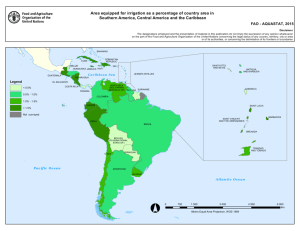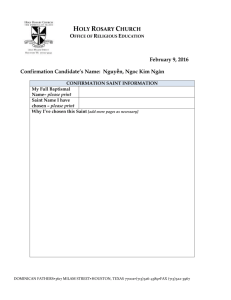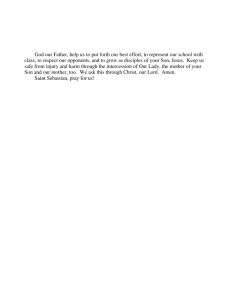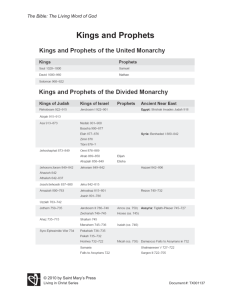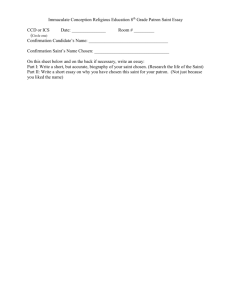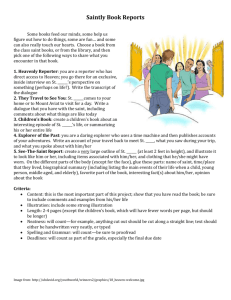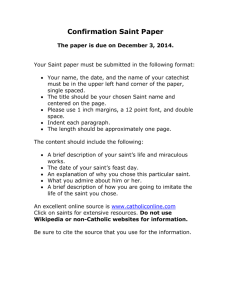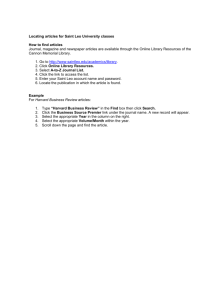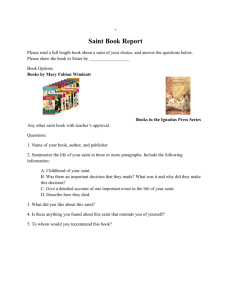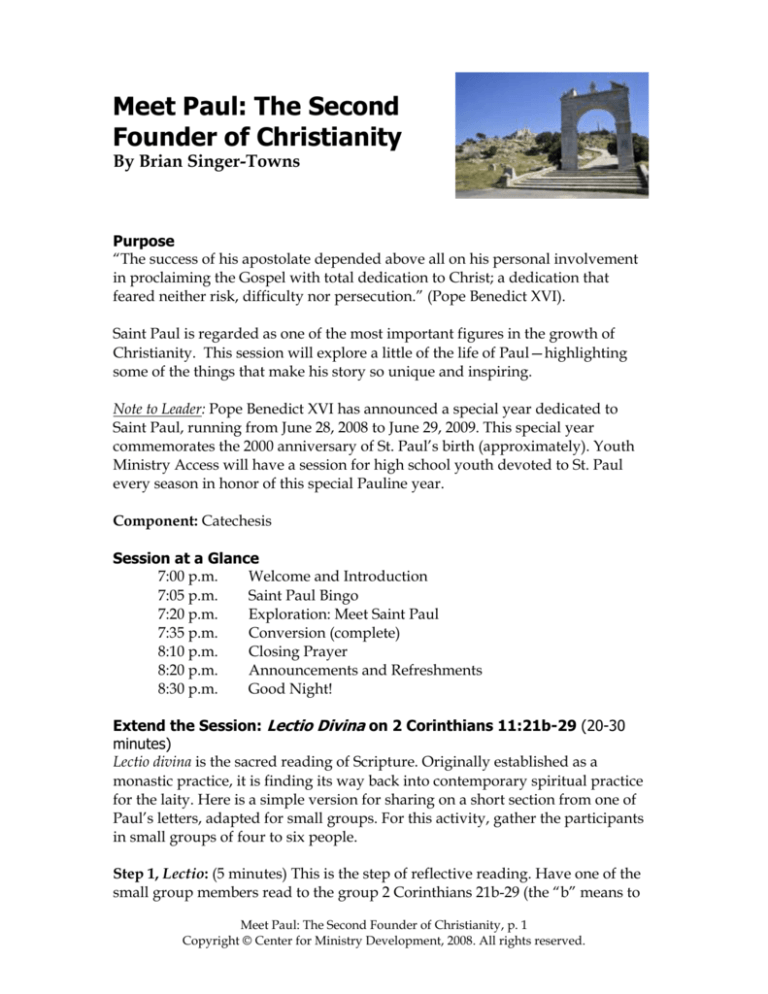
Meet Paul: The Second
Founder of Christianity
By Brian Singer-Towns
Purpose
“The success of his apostolate depended above all on his personal involvement
in proclaiming the Gospel with total dedication to Christ; a dedication that
feared neither risk, difficulty nor persecution.” (Pope Benedict XVI).
Saint Paul is regarded as one of the most important figures in the growth of
Christianity. This session will explore a little of the life of Paul—highlighting
some of the things that make his story so unique and inspiring.
Note to Leader: Pope Benedict XVI has announced a special year dedicated to
Saint Paul, running from June 28, 2008 to June 29, 2009. This special year
commemorates the 2000 anniversary of St. Paul’s birth (approximately). Youth
Ministry Access will have a session for high school youth devoted to St. Paul
every season in honor of this special Pauline year.
Component: Catechesis
Session at a Glance
7:00 p.m.
Welcome and Introduction
7:05 p.m.
Saint Paul Bingo
7:20 p.m.
Exploration: Meet Saint Paul
7:35 p.m.
Conversion (complete)
8:10 p.m.
Closing Prayer
8:20 p.m.
Announcements and Refreshments
8:30 p.m.
Good Night!
Extend the Session: Lectio Divina on 2 Corinthians 11:21b-29 (20-30
minutes)
Lectio divina is the sacred reading of Scripture. Originally established as a
monastic practice, it is finding its way back into contemporary spiritual practice
for the laity. Here is a simple version for sharing on a short section from one of
Paul’s letters, adapted for small groups. For this activity, gather the participants
in small groups of four to six people.
Step 1, Lectio: (5 minutes) This is the step of reflective reading. Have one of the
small group members read to the group 2 Corinthians 21b-29 (the “b” means to
Meet Paul: The Second Founder of Christianity, p. 1
Copyright © Center for Ministry Development, 2008. All rights reserved.
start reading with the second sentence of verse 21). This section is sometimes
called “Paul’s Labors” or “Paul’s Hardships.” It should be read clearly and
slowly. After a few moments of silent reflection, each group member is invited to
share a word, phrase, or image that sticks with him or her.
Step 2, Meditatio: (10-15 minutes) This is the step of meditating on the reading.
Have someone in the small group read the passage a second time, again, slowly
and reflectively. Invite the small group members to share briefly on these
questions:
How do you feel about Saint Paul after hearing this list of his trials?
What could motivate someone to endure this kind of hardship and
suffering?
How might Christians suffer today when they spread the Gospel
message?
Step 3, Oratio: (3-5 minutes) This is the step of prayer. Invite the small group
members to pray, silently or out loud, for the needs of the person to their right.
Step 4, Contemplatio: (2-3 minutes) This is the step of contemplation or resting
in God. Invite the small group members to quiet their minds and hearts and
allow themselves to feel the love of God. To help this process, they can silently
and slowly repeat the words, “God is love.”
Materials Needed
• Bibles, one for each participant
• Tablecloth, cross, candle and matches or a lightstick
• Pens, one for each participant
• Handout 1, Saint Paul Bingo, one for each participant
• Prize(s) for Saint Paul Bingo, optional
• Handout 2, Convert Me, O Lord, one for each participant
• Raw egg, hard boiled egg, and a bowl
Prepare in Advance
1. Create a prayer table with the table cloth, cross, and the Bible. Put it in an area
of the room where you can gather around it for the closing prayer.
2. Prepare to lead a short presentation/discussion using Resource 2, Leader
Background Material.
3. Hard boil an egg and mark it discreetly with a small x.
Meet Paul: The Second Founder of Christianity, p. 2
Copyright © Center for Ministry Development, 2008. All rights reserved.
4. Create charade prompts by cutting apart slips of paper of different
conversions (see Resource 3, Conversion Slips). Put these slips in a bag or
bowl.
5. If you choose, prepare a volunteer in advance to lead the closing prayer.
Welcome and Introductions (5 minutes)
Greet the participants warmly as they arrive and give everyone a nametag. If
there are participants who are new, be sure they get a chance to introduce
themselves and receive a warm welcome to the evening. Introduce the session by
saying something like:
Today we are going to be learning about the life of a very important person in
the history of Christianity. I’m going to give you a few clues and see if you
can tell me who it is. One, he was born just a few years after Jesus. Two, he
never met Jesus in person but became one of Jesus’ greatest defenders.
Three, he and Saint Peter are regarded as the most important leaders of the
first Christians. Fourth, he wrote more of the New Testament than any other
person. Does anyone know who I’m talking about? (Wait for some answers.)
This person is Saint Paul. We are going to learn a little about his life and what
he did for the early Church. Let’s be as committed and excited to follow the
Lord as Paul himself was!
[Add this if you are holding this session during the special Pauline year.] It is
particularly appropriate that we look at Paul’s life during this year because
Pope Benedict has proclaimed this year as a special time to remember Saint
Paul. This is because this year marks the two thousandth anniversary of
Paul’s birth.
Saint Paul Bingo (15 minutes)
Note to Leader: Determine in advance if you are going to have some simple
prize(s) for the first person or persons who correctly fill in their Bingo sheets.
Step 1: Give the following directions:
We’re going to start by playing a bingo game based on the life of Saint Paul.
Each of you will receive a simple bingo card with nine squares. The middle
square is a free square; all you have to do is write your name in it. The other
eight squares ask a question about something in the life of Saint Paul. You
must move around the room and find people who can correctly respond to the
questions—a different person for each square. At the same time, people will
be asking you if you know the answer to any of the questions in the squares.
You will probably have to look up the Bible passages indicated in the squares
to answer the questions correctly.
Meet Paul: The Second Founder of Christianity, p. 3
Copyright © Center for Ministry Development, 2008. All rights reserved.
You complete your bingo card by finding eight different people to write in the
correct answers and initial the eight squares on your bingo sheet. Show you
are finished by jumping up and down and yelling, “I’m a Saint Paul expert.”
Do not look at your bingo card or start playing until everyone has a card and I
say “Go!”
Note to Leader: To expedite play, consider assigning an equal number of
participants to each of the eight question squares. They will be responsible for
finding the answer to their assigned square, thus becoming the “expert” for that
square.
Step 2: Distribute a Bible, Handout 1, Saint Paul Bingo, and a pen to each
participant. When everyone has these three things, shout “Go!” If some
participants are not familiar with looking up passages in the Bible, leaders may
need to move around and help as necessary. Keep track of the first person(s) to
finish, but allow the bingo game to continue until most participants are done—or
until you are nearing the end of the allotted time. If you are awarding prizes
check the winner’s answers for correctness using Resource 1, Saint Paul Bingo
Answer Key and award the prizes with appropriate pomp and circumstance.
You will go over the bingo answers in the next activity.
Exploration: The Life of Saint Paul (15 minutes)
For the next fifteen minutes or so, use the questions and answers from the Saint
Paul Bingo to give an interactive presentation on the life of Paul. Resource 2,
Leader Presentation Guide, will guide you in leading the
presentation/discussion.
Conversion Charades (35 minutes)
Note to Leader: In this activity you will start by demonstrating the effects of
conversion by using the tried and true example of the raw egg and the
hardboiled egg. Be sure to keep which egg is which straight! Feel free to
substitute any other symbolic example you know of how something is converted
from one thing to another while still keeping its basic identity.
Step 1: (5 minutes) Introduce the activity with this demonstration:
As we have just discussed, Saint Paul underwent a conversion that completely
changed the direction of his life. We can think of conversion kind of like this.
[Hold up the raw egg.] Imagine this egg is someone with an unconverted
heart. When pressure is applied [rap egg on edge of bowl], the person cracks
and is lost [drop cracked egg into bowl].
Meet Paul: The Second Founder of Christianity, p. 4
Copyright © Center for Ministry Development, 2008. All rights reserved.
Now imagine that this egg represents someone whose heart has undergone a
conversion to faith in Christ [hold up hardboiled egg]. When pressure is
applied to this egg [toss to someone nearby], it stays intact. The difference is
that this egg was dipped in boiling water until it experienced a
transformation, a conversion if you will. What is the beginning of Christian
transformation, which also has to do with water? [Hopefully, someone will
respond with “Baptism.”]
Can you think of any other similarities between the conversion a hardboiled
egg undergoes, and the conversion of a Christian believer? [This is just a
question to get their creative thinking going. Some possible answers might be:
both take time; like the egg, the person still looks the same outside but is
different inside; the egg’s conversion makes it more useful, Christian conversion
makes us more helpful.]
Step 2: (10 minutes) Give the follow directions:
Our conversion as Christians doesn’t make us perfect at the moment of our
Baptism. Rather, our Baptism opens us up to God’s grace so that we are on a
lifelong journey of becoming perfected in Christ. And there are different
aspects of our life that need God’s help so that we can overcome sin and
become transformed. We are going to play conversion charades. You will be
part of a two person team. I will give your team a particular kind of
conversion that Christians experience. You will have five minutes to figure out
some ways of acting out that conversion without using any words. Then,
when it is your turn, you will act it out together while everyone else tries to
guess what kind of conversion you are demonstrating.
Divide people into pairs and have them pick a conversion slip from the bag or
bowl you have prepared. Allow the pairs about five or so minutes to plan.
Step 3: (20 minutes) Gather the teams back and invite each team up to perform
their charade. Invite the large group to guess aloud what type of conversion each
team is acting out. Continue until all the teams have done their charades. End by
summarizing in these or similar words. If you have time, invite participants to
share their observations or thoughts about conversion.
In his letter to the Romans, Paul said “Do not be conformed to this world,but
be transformed by the renewing of your minds” (Rom 12:2). It is easy to
accept the actions and attitudes that are often prevalent in our society, even
if they go against what we know is truly God’s will. Following the world’s
values will never lead to true happiness if those values go against God’s
values.
If we are facing an area in our lives which needs significant conversion we
may not be able to do it on our own, particularly if we are experiencing an
addiction. Sometimes we must acknowledge that we are powerless on our
own and can only change with God’s help and the support of others. Let us
Meet Paul: The Second Founder of Christianity, p. 5
Copyright © Center for Ministry Development, 2008. All rights reserved.
pray that we will recognize the areas in our life that need conversion, and ask
God to help us change.
What are your thoughts about conversion?
Closing Prayer: Convert Me, O Lord (10 minutes)
The closing prayer will be a reading and response prayer using Handout 2,
Convert Me, O Lord. Gather the participants around the prayer table. Pass out
Handout 2 to the participants. Either take the reader part yourself or ask for a
volunteer to read it. Ask for five volunteers to read the readers’ parts. Invite
everyone to center themselves with a few seconds of silence and then begin the
prayer. At the end you may allow time for spontaneous shared prayer where
indicated or just go directly to the Our Father.
Finish by sharing a Sign of Peace.
Announcements and Refreshments (10 minutes)
Thank everyone for their participation in tonight’s program. Serve light
refreshments, and make any announcements that are needed.
This session was written by Brian Singer-Towns, Senior Editor, Saint Mary’s
Press, Winona, Minnesota.
Meet Paul: The Second Founder of Christianity, p. 6
Copyright © Center for Ministry Development, 2008. All rights reserved.
Handout 1
Saint Paul Bingo
Each of these squares asks a question about the life of Saint Paul, who is also called
Saul (his Hebrew name). You must find people who can correctly respond to the
questions—a different person for each square. (Hint: This may require them to use their
Bibles!) Have each person write their answer in the square and initial it. When you have
an answer for every square, jump up and down and say,
"I'm a Saint Paul expert!"
The first one to do this will be stared at by everyone else.
1. When we first meet
Saul, what disturbing
event is he watching
over and approving?
(Acts 7:59—8:1)
2. What city was Paul
from? (Acts 21:39)
Answer:
Answer:
Answer:
4. How did the disciples
in Jerusalem react
when Paul first
showed up?
(Acts 9:26)
5.
FREE
SPACE
Your Name:
Answer:
7. Paul realized he had a
special mission to
what group of people?
(Acts 13:46-47)
Answer:
3. What did Christ say to
Paul when he
appeared to Paul in a
blinding light? (Acts
9:4-5)
8. Who were the
husband and wife
team who became
partners with Paul?
(Acts 18:1-3)
Answer:
6. What was the name of
the Christian who first
befriended Paul? (Acts
9:27, 11:22-26)
Answer:
9. What phrase does Paul
use at the beginning of
most of his letters?
(1 Cor 1:3)
Answer:
Meet Paul: The Second Founder of Christianity, p. 7
Copyright © Center for Ministry Development, 2008. All rights reserved.
Resource 1
Saint Paul Bingo Answer Key
1. When we first meet
Saul, what disturbing
event is he watching
over and approving?
(Acts 7:59—8:1)
2. What city was Paul
from? (Acts 21:39)
Answer: Tarsus
Answer: The stoning
(martyrdom) of Saint
Stephen
4. How did the disciples
in Jerusalem react
when Paul first
showed up? (Acts
9:26)
Answer: They were
afraid of Paul
7. Paul realized he had a
special mission to
what group of people?
(Acts 13:46-47)
Answer: The Gentiles
(non-Jews)
3. What did Christ say to
Paul when he
appeared to Paul in a
blinding light? (Acts
9:4-5)
Answer: “Saul, Saul,
why are you
persecuting me?”
5.
FREE
SPACE
Your Name:
8. Who were the
husband and wife
team who became
partners with Paul?
(Acts 18:1-3)
Answer: Priscilla and
Aquila
6. What was the name of
the Christian who first
befriended Paul? (Acts
9:27, 11:22-26)
Answer: Barnabas
9. What phrase does Paul
use at the beginning of
most of his letters? (1
Cor 1:3)
Answer: “Grace to you
and peace from God
our Father and the
Lord Jesus Christ”
Meet Paul: The Second Founder of Christianity, p. 8
Copyright © Center for Ministry Development, 2008. All rights reserved.
Resource 2
Leader Presentation Guide
Purpose
The purpose of this presentation and discussion is to introduce participants to the life of
Paul. This guide shows you how to draw on the information the participants discovered
through the Saint Paul Bingo activity. Italicized questions are the questions to throw out
to the participants. The hoped for—that is, the correct--answers follow in parentheses.
Each point ends with a possible discussion question that you can ask the group.
While you can lead this as a simple and straightforward presentation, consider
presenting it in a more colorful and engaging way. For example, dress up as Saint Paul
and have someone introduce you to the group, after which you tell your life story and
take questions. Or videotape an interview between Paul and a famous reporter. Or role
play Paul as a guest on the Daily Show (Jon Stewart is Jewish) or the Colbert Report
(Stephen Colbert is Catholic).
Part 1: Paul’s Early Life
We first meet Paul in the Acts of the Apostles where he witnesses and approves of a
very disturbing event. What was that event? (the execution of Saint Stephen). That’s right,
Paul, whose Hebrew name was Saul, was a persecutor of Christians in his early life.
That’s because Paul was a strong and faithful Jew also who belonged to a group of Jews
called the Pharisees. The Pharisees were originally respected for their zealousness in
following the Law of Moses and their passion for living their faith.
But many Pharisees and other Jewish leaders saw this new group within
Judaism--Jews who believed that Jesus was the Messiah--as enemies to true Jewish
belief. They were determined to stamp out this “heresy” before other Jews got on board.
It seems that Saul was part of that group.
But Paul was not born in Jerusalem or even in Israel. Where was he born? (Tarsus).
Paul was born in Tarsus, an important seaport city in what is now modern day Turkey.
Paul would have been part of a Jewish community there but he would also have been
exposed to Greek and Roman culture. Because of this Paul would have been literate in
both Hebrew and Greek. This would come in very handy in the future when he became
a missionary reaching out to both Jews and non-Jews. And because Tarsus was a free
Roman town, Paul was also a Roman citizen with civil rights. This would come in handy
when his former friends, the Jewish leaders, wanted to put him to death.
How do you feel about people with religious beliefs that are different from yours? If they were
spreading teachings they claimed were Catholic--but you believe were wrong--how would you
respond?
Part 2: Paul’s Conversion
So how did Paul get from Christian persecutor to Christian evangelist and missionary?
The answer is told in a story told in Acts chapter 9. Paul was on the now famous road to
Damascus to capture any Christians he could find. As he was nearing Damascus he was
knocked to the ground by a bright light and heard Christ speaking to him. And what did
Christ say? (“Saul, Saul, why are you persecuting me?) That event changed Paul’s life. He
was blind for three days before God sent a disciple named Ananias to lay hands on Paul
Meet Paul: The Second Founder of Christianity, p. 9
Copyright © Center for Ministry Development, 2008. All rights reserved.
so that he would be filled with the Holy Spirit. As soon as Ananias did so, Paul regained
his sight and was then baptized.
Paul immediately began to tell other Jews that Jesus was the Messiah. This
sudden change did not sit well with some Jews who now plotted to kill Paul. Paul
decided to leave Damascus and visit the disciples in Jerusalem. How did the disciples in
Jerusalem react when Paul first showed up? (they were afraid of him). They were afraid of him
because they did not trust his sudden conversion. It took some time, but Paul convinced
them that he was sincere. When they became aware of plots on Paul’s life in Jerusalem,
they sent him back to his home in Tarsus.
During this time, one of the Jerusalem disciples became a close friend and
supporter of Paul. He defended Paul when Paul was in Jerusalem and sought Paul’s
help to minister to the infant church in Antioch. What was that friend’s name? (Barnabas).
Barnabas continued to be Paul’s partner as Paul begins a new phase of his ministry.
Do you believe that God can do dramatic things to get our attention? Do you have any examples?
Why is it important to have good Christian friends to support us in being faithful to Christ?
Point 3: Paul’s Life as a Christian Missionary
At this point Paul’s life really starts to get interesting. While they were in Antioch the
Holy Spirit calls Paul and Barnabas to go on a missionary journey. While on this journey
they convert a Roman proconsul (Acts 13:6-12), gave a long evangelistic speech (Acts
13:16-41), and had people call them gods because they cured a man who was crippled
(Acts 8-13). It was during this trip that Paul realized that he had a special mission to what group
of people? (the Gentiles, or non-Jews).
After returning to Antioch once again, Paul continued to travel and preach the
Gospel. He went on two more long missionary journeys. Unfortunately, he and
Barnabas parted ways. But Paul met many more people who became supporters,
traveling companions and fellow missionaries: Silas, Timothy, and Lydia to name a few.
He also worked with a married couple, what were their names? (Priscilla and Aquila). He
continued to have many adventures including being imprisoned twice (Acts 16:116-24,
22:22-29), was involved in several riots (Acts 17:13, 21:27-36), and raised back to life a
boy who had fallen to his death while listening to Paul preach (20:7-12)!
One of the things that we most remember Paul for is the letters he wrote. Most of
his letters he wrote to Christian communities, but at least one was written to an
individual (Philemon). What was the phrase Paul used at the beginning of almost every letter?
(Grace to you and peace from God our Father and the Lord Jesus Christ). In his letters Paul
gave practical advice, corrected mistaken beliefs, and encouraged everyone to live in
love and set a good example so that others would come to believe in Jesus Christ.
At one point Paul was taken into custody by the Roman soldiers and taken to
Rome for trial. Paul’s proclamation that Jesus was the only son of God was a direct
challenge to the Roman emperors who proclaimed themselves as divine. While under
arrest he continued to write and to meet with Christian messengers. He never lost heart
and even looked forward to death as doorway to be with Christ in glory. Tradition says
that Paul was beheaded in 67 or 68 A.D.
How do people work as missionaries today? Do we need to go to a foreign country in order to be a
missionary? How can we spread the Gospel in our own community?
Meet Paul: The Second Founder of Christianity, p. 10
Copyright © Center for Ministry Development, 2008. All rights reserved.
Resource 3
Conversion Slips
Directions: Cut apart into slips of paper. If you have a larger group, you may
need to come with additional types of conversion or repeat these.
------------------------------------------------------- Conversion from being a lazy person to working hard to achieve your
goals
------------------------------------------------------- Conversion from complaining about life to being thankful for God’s
blessings
------------------------------------------------------- Conversion from taking revenge to offering forgiveness
------------------------------------------------------- Conversion from being lustful (sexual sin) to being chaste (sexually pure)
------------------------------------------------------- Conversion from anger and violence to being a person of peace
------------------------------------------------------- Conversion from acting selfishly to seeking the good of others first
------------------------------------------------------- Conversion from always criticizing others to seeing the good in others
------------------------------------------------------- Conversion from being jealous of other people’s gifts to affirming other
people’s gifts
------------------------------------------------------- Conversion from being greedy to giving generously to others and living
simply
------------------------------------------------------- Conversion being envious of other people’s things to being content with
what you have
--------------------------------------------------------
Meet Paul: The Second Founder of Christianity, p. 11
Copyright © Center for Ministry Development, 2008. All rights reserved.
Handout 2
Convert Me, O Lord!
Prayer Leader: Conversion is a part of the Christian life. At Baptism we are
called to turn away from sin and turn to a life based on a belief in God the Father,
Son, and Holy Spirit. Every time we receive the Eucharist we are nourished by
the Body and Blood of Christ, to become what we eat. Using the words of St.
Paul, let us ask for God’s help in turning toward God.
Reader 1: Love is patient, love is kind. It is not jealous, it is not pompous, it is not
inflated, it is not rude, it does not seek its own interests, is not quick-tempered, it
does not brood over injury, it does not rejoice over wrongdoings but rejoices
with the truth. (1 Cor 13:4-6)
All: Lord, help us turn away from selfishness and toward true love of others.
Reader 2: For as long as there is jealousy and quarreling among you, are you not
of the flesh, and behaving according to human inclinations? (1 Cor 3:3)
All: Lord, help us turn away from jealousy and toward gratitude.
Reader 3: Avoid [sexual] immorality. Every other sin a person commits is
outside the body, but the immoral person sins against his own body. Do you not
know that your body is a temple of the holy Spirit within you? (1 Cor 6:18-19)
All: Lord, help us turn away from sexual sin and toward sexual purity.
Reader 4: Have the same regard for one another; do not be haughty but associate
with the lowly; do not be wise in your own estimation. (Rom 12:16)
All: Lord, help us turn away from pride and toward true humility.
Reader 5: Do not repay anyone evil for evil; be concerned for what is noble in the
sight of all. If possible, on your part, live at peace with all. Beloved, do not look
for revenge. (Rom 12: 17-19)
All: Lord, help us turn away from revenge and violence and toward peace and
reconciliation.
Prayer Leader: I invite you to share other needs you would like all of us to pray
for. [When everyone has finished, continue.] Let us conclude by praying together
the prayer Jesus taught us . . . [everyone join in] Our Father . . .
Meet Paul: The Second Founder of Christianity, p. 12
Copyright © Center for Ministry Development, 2008. All rights reserved.

